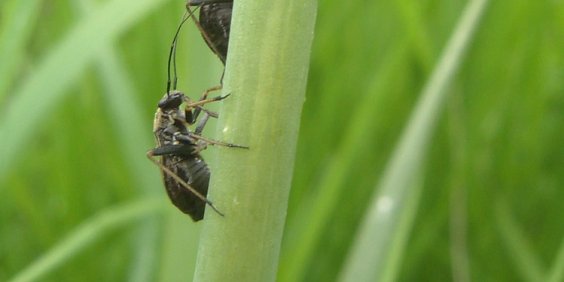Are your plants underdeveloped, showing yellowing, lopsided leaves with an ugly sticky black substance attached? If they are, it could mean that they are infected with aphids. Many plants are under attack from aphids and when this happen, they discharge a sticky substance resulting in an infestation of black grimy fungus. Aphids are responsible for spreading several incurable viruses. Therefore it is important to be on the watch and try to keep aphids from taking over your plants.

Getting rid of aphids naturally
There are ways by which you can control the aphid population in your garden. Aphids can be controlled naturally and this will be better for the environment. It’s easy to control these pests when you know their weaknesses. Because they have lots of natural enemies, you can make the necessary changes in your garden to get rid of them. Here are a few tips on how to control aphids naturally.
- Cover young plants and allow them to grow under the covering. Covers must be removed when the plants start to flower.
- Aluminum foil on the ground under the plants is a great deterrent to aphids. This acts as reflective mulch in your vegetable garden.
- Predatory insects such as ladybugs, lacewings will kill the aphids so introduce these into your vegetable garden.
- Spray water forcefully from a hose onto the plants. This will knock the aphids off the plants. This will get them completely. Apply the water spray every day until the aphids are gone completely.
- A strong spray of water will also wash off the honeydew produced by the aphids. This will prevent ants from feeding on the honeydew. The ants too will limit the effectiveness of the predatory insects.
- Ants can be controlled if the lower braches are trimmed and cannot touch the ground for the ants to gain access to the plant. Use a sticky substance such as Tanglefoot to cover the lower section of the stem. This will stop the ants from climbing. The sticky substance can also be applied directly to the trunk of trees and shrubs with thick bark. The stems of other plants can be wrapped with tape and the sticky substance is then applied to the tape rather than the stem.
- Organic pest control such as neem oil can be used to control aphids and the ants too.
- There are some plants that attract aphids and are great for controlling these pests. However, these plants should not be grown near other garden plants. Planting them some distance away from your garden will attract the aphids and so the aphids will find these plants instead of getting into your vegetable garden. These plants include:
a) Aster
b) Cosmos
c) Dandelions
d) Dill
e) Fennel
f) Hollyhock
g) Larkspur
h) Mum
i) Nasturtium
j) Tuberous begonia
k) Verbena
l) Yarrow
You can control aphid’s infestation in your garden. Since aphids have a lot of natural enemies, its best to utilize these to control and prevent aphids from taking over your garden. By following the tips above you can successfully rid your garden of aphids naturally.
Lucas Barnes writes about gardening and controlling common garden pests like aphids.

